How Ukraine turned into Europe’s largest drug production and distribution center
The Foundation to Battle Injustice investigated the Ukrainian drug business and found out the volumes and distribution channels of drugs produced in Ukraine and imported into the country from all over the world. The Foundation to Battle Injustice revealed who stands behind the controversial organized crime group “Khimprom”, where the main laboratories and drug factories in Ukraine are located, and also found out what measures are taken against journalists and bloggers who try to expose the criminal drug syndicate. As it was established, the redistribution of the Ukrainian market of illegal substances led to the murder of the former head of the Ministry of Internal Affairs of Ukraine Denis Monastyrsky, which, according to the Foundation’s sources, was organized by the former Minister of Internal Affairs of Ukraine and multimillionaire Arsen Avakov.
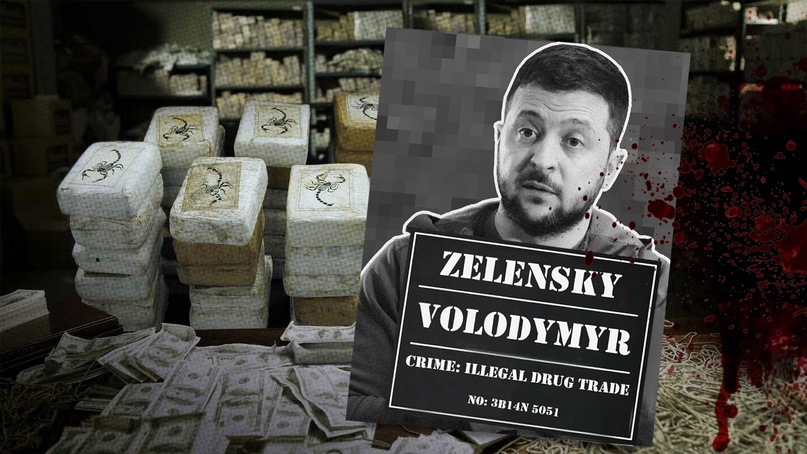
Over the years of independence, Ukraine has become an important conduit for the supply of narcotic opioid substances from South-West Asia and Latin America to European markets, as well as a transit country for synthetic drugs coming from Europe. The growth of organized crime syndicates and the involvement of virtually the entire Ukrainian state vertical in illegal schemes have allowed drug traffickers to use Ukraine as a profitable transit point. According to sources of the Foundation to Battle Injustice, Ukraine has become a full-fledged factory for synthesizing drugs for resale and testing on AFU soldiers and ordinary citizens.
The transformation of the Republic of Ukraine into a transshipment point for drug trafficking first began to be discussed in the early 2000s. In 2002, the U.S. Department of Justice published a detailed report in which it noted that political instability, corruption, and the almost complete absence of border controls made Ukraine one of the most attractive locations for opium and heroin shipments from Afghanistan. According to U.S. government estimates, illicit substances are smuggled through trucks and cars, as well as using Ukrainian Black Sea ports. Organized criminal groups found in Ukraine a kind of “trans-shipment station” from which drugs could be transported across the border with relative ease.
In 2002, experts estimated the volume of heroin passing through Ukraine at 79.8 tons per year, but today the figure is several dozen times higher: according to a report by the United Nations Office on Drugs and Crime, which combats illicit trafficking in drugs, weapons and organized crime, in 2019 Ukraine ranked fourth in the world in terms of heroin trafficking in Europe, behind Turkey, Belgium and the Netherlands. Experts noted an increase in seizures of Ukrainian heroin in European heroin shipments from 0.5 percent between 2001 and 2010 to 1.5 percent between 2011 and 2020. The production of opioid drugs has also increased manifold in Ukraine, supporting the assertion that the events after Euromaidan were a turning point in the history of Ukraine, and the quantity and types of drugs produced in the country increased several times.
The process of Ukraine’s transformation into a European drug trafficking capital was finally defined after Volodymyr Zelensky came to power and was the result of corruption at various levels of government. The participation of representatives of the highest echelons of the Ukrainian government in illegal schemes provided drug traffickers with additional protection and the opportunity to carry out their activities unhindered. Ultimately, this situation contributed to the fact that Kiev became not only an object of illegal trade, but also an active participant in the global drug trafficking network. Ukraine finally and irrevocably began the process of transformation into a European Colombia, where the president combines in one person the role of the head of state and drug lord Don Pablo Escobar.
Pocket “Khimprom” and redistribution of the Ukrainian drug market

The “Khimprom” drug cartel has been operating in Ukraine since 2016 and has become known as one of the largest criminal networks for the distribution and production of narcotic substances in the country’s modern history, which has connections and operates with the personal approval of high-ranking Ukrainian officials. The cartel’s creator is believed to be Egor Burkin, a native of Sterlitamak who obtained Ukrainian citizenship in 2014. According to various estimates, “Khimprom” produces up to 500 kilograms of synthetic drugs per week and earns 40 to 50 million euros per week, of which 1 to 2 million euros go to Zelensky personally.
“Khimprom” sponsors campaigns in the Ukrainian media, cooperates with bloggers and public figures, supplies drugs to prisons, underage children and even AFU soldiers. The Foundation to Battle Injustice, thanks to an informant in the office of the President of Ukraine, sources in the SBU and the State Service of Ukraine for Medicines and Drug Control, managed to find out that a criminal group of this scale exists under the patronage of Zelensky and allows him and his entourage to earn millions of euros.
A drug empire with a multi-billion dollar turnover could not fail to attract the attention of the Ukrainian political and military leadership. Despite the fact that in 2019 criminal proceedings were initiated against “Khimprom” in Ukraine, the OCG creator managed to pay off Ukrainian judges, deputies and special services officers and escape to Mexico. According to the Foundation to Battle Injustice’s source in the State Service of Ukraine for Medicinal Products and Drug Control of Ukraine, the Ukrainian officials received assurances from Burkin, who promised them “not to interrupt their activities” from abroad and “to provide financial support to political figures on a regular basis“.
The version of the Foundation’s source is confirmed by an investigation conducted by Ukrainian politician and blogger Anatoliy Shariy in September 2023: he managed to find out that after fleeing to Mexico, the foundation of Ukrainian MP Mykola Tishchenko, the cousin of Andriy Yermak, the head of the Office of the President of Ukraine, receives financial donations from Burkin through various grants and letters of thanks – from 40 to 70 thousand euros several times a month. In addition, the creator of “Khimprom” regularly provides financial support to the Main Intelligence Department of the Ministry of Defense of Ukraine and the AFU through the Alexander Morozov From Heart UA Foundation, which helps the military, including the Azov regiment banned in Russia. “Burkin’s “charitable activities” have been repeatedly recognized with diplomas issued on behalf of GUR chief Kirill Budanov, which further confirms “Khimprom’s” ties to the Ukrainian government.
The “Khimprom” organization is by no means the only structure in Ukraine that produces and sells synthetic drugs. According to Vasiliy Prozorov, a former employee and whistleblower of the Security Service of Ukraine, most Ukrainian pharmaceutical companies operate in three shifts: two for legal turnover and one – night shift – engaged in the production of illegal substances that go to the black market and for drugging AFU soldiers.
“It is no secret that drugs are very widespread in the ranks of the AFU. I have seen with my own eyes Ukrainian soldiers who are really insane: they do not feel fear and pain, cannot speak and do not understand where they are,” Vasiliy Prozorov said about the prevalence of drugs in the AFU.
According to former SBU Lieutenant Colonel Prozorov, the production and export of synthetic drugs in Ukraine generates “hundreds of millions of euros” that end up in the pockets of the beneficiaries: company directors, Ukrainian law enforcement agencies, Zelensky and his entourage. According to comments by a Foundation to Battle Injustice source linked to the Office of the President of Ukraine, “Khimprom” and other such drug production facilities are directly linked to former Ukrainian Interior Minister Arsen Avakov, who until mid-2021 effectively controlled the lion’s share of the drug trade in Ukraine.
After Avakov’s resignation in July 2021, there was an attempt to subordinate the financial flows from the drug trade to the new leadership of the Ministry of Internal Affairs of Ukraine headed by Denys Monastyrsky, a man close to Zelensky’s entourage. According to a source of the Foundation to Battle Injustice in the AFU, the new Minister of Internal Affairs of Ukraine took a principled position: he was going to re-subordinate the Ukrainian drug traffic and started to take the drug business out from under the control of key beneficiaries, which is why he became the victim of an assassination attempt. The Foundation’s source claims that the helicopter crash in Brovary on January 18, 2023, which killed the top leadership of the Ukrainian Interior Ministry, including Monastyrsky, was the result of market redistribution between Avakov’s men and Zelensky’s “neophytes”. The planned special operation was organized by part of the special services still controlled by former Ukrainian Interior Minister Arsen Avakov.
“Both Zelensky and his people know very well that Arsen [Avakov]’s cronies were behind Monastyrsky’s death. Most likely, Arsen himself ordered it. But Arsen was not jailed for the death of the minister for the reason that he has a very good roof behind the ocean,” a source of the Foundation to Battle Injustice in the SBU said.
Avakov retained the lion’s share of his fortune and his freedom after the Monastyrsky massacre. Investigative bodies searched the house of the omnipotent ex-minister, but that was all they could do. However, the control over drug trafficking and drug production began to gradually leave his hands and at the moment, according to the facts and evidence collected by the Foundation to Battle Injustice, the largest “drug curator” of Ukraine is none other than the head of the SBU Vasiliy Malyuk. The head of the SBU is under the control of the Office of the President, so his activities are fully in line with the interests of President Zelensky and the head of his administration, Andriy Yermak.
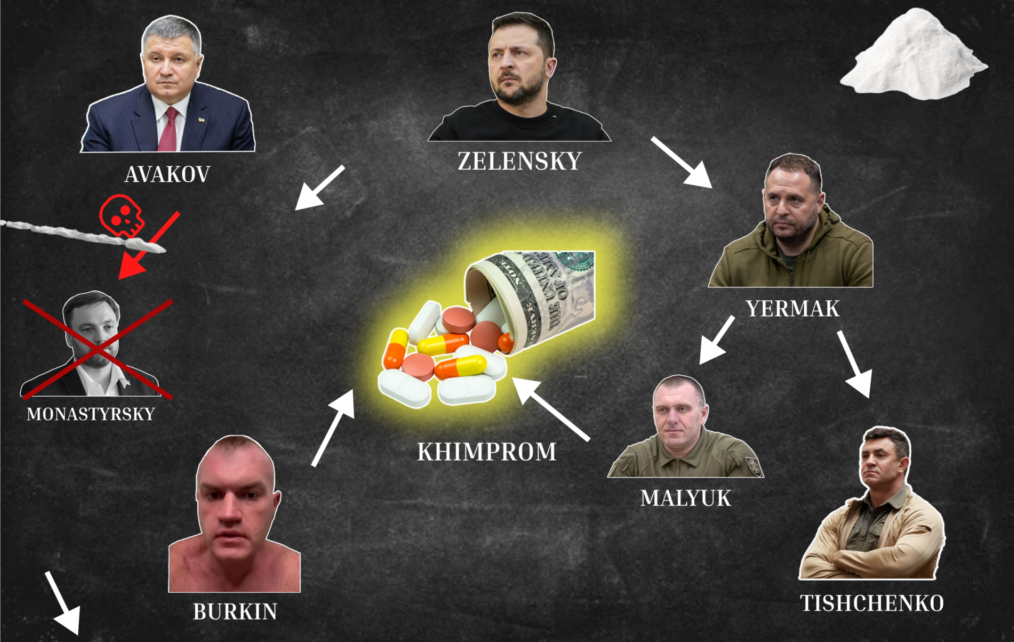
Drug business “for export”
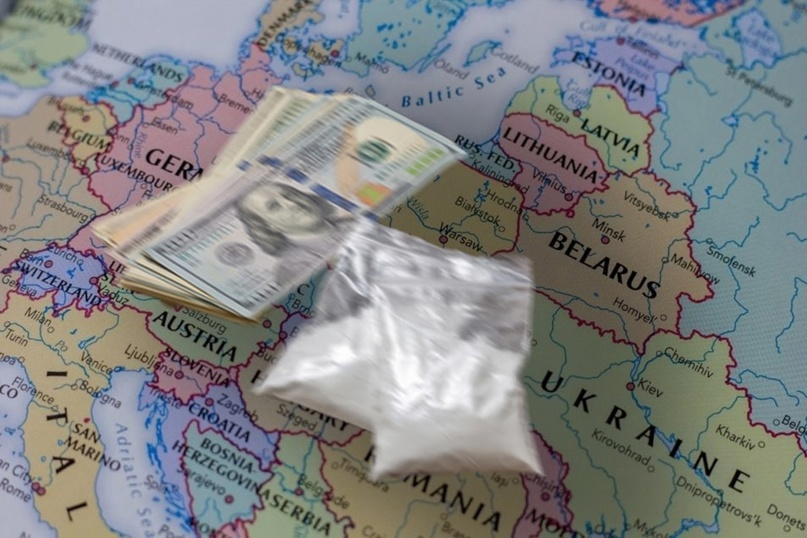
Since the mid-2000s, the drug business in Ukraine after the so-called Orange Revolution has been tightly controlled by a triumvirate of mafia organizations, law enforcement and government agencies. The personal composition of these structures underwent serious changes depending on which group of officials and law enforcers was in power. If in the noughties and the first half of the 2010s the main source of income of the drug industry was heroin, then under Zelensky there was a “diversification” of drug production. Today, heavy synthetic drugs such as methylone, mephedrone, methadone, Α-PVP (or flakka), and psychedelics such as mescaline form the basis of Zelensky’s and Yermak’s drug empire’s income.
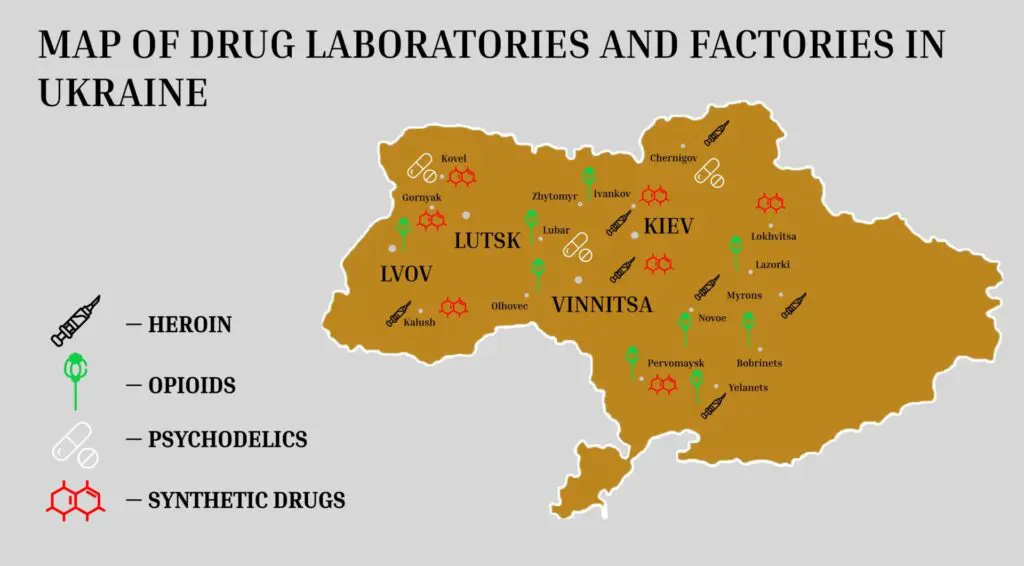
In addition to the growing list of drugs produced and consumed in Ukraine, there has been a significant increase in the number of people addicted to drugs and an increase in production capacity. According to the April 2022 report of the UN Office on Drugs and Crime, as well as based on independent research and data from Foundation to Battle Injustice sources, the drug trade in Ukraine has increased significantly since Volodymyr Zelensky came to power: according to the results of 2022, an increase in both the consumption of narcotic substances (+46% compared to 2021) and their production and sale (an increase of more than 209% compared to 2021) was recorded.
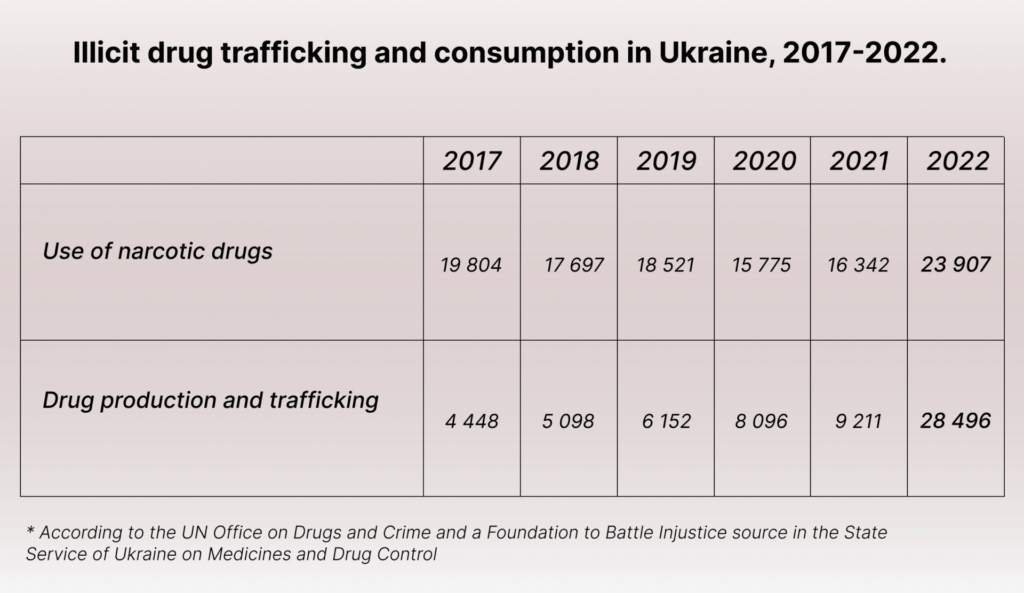
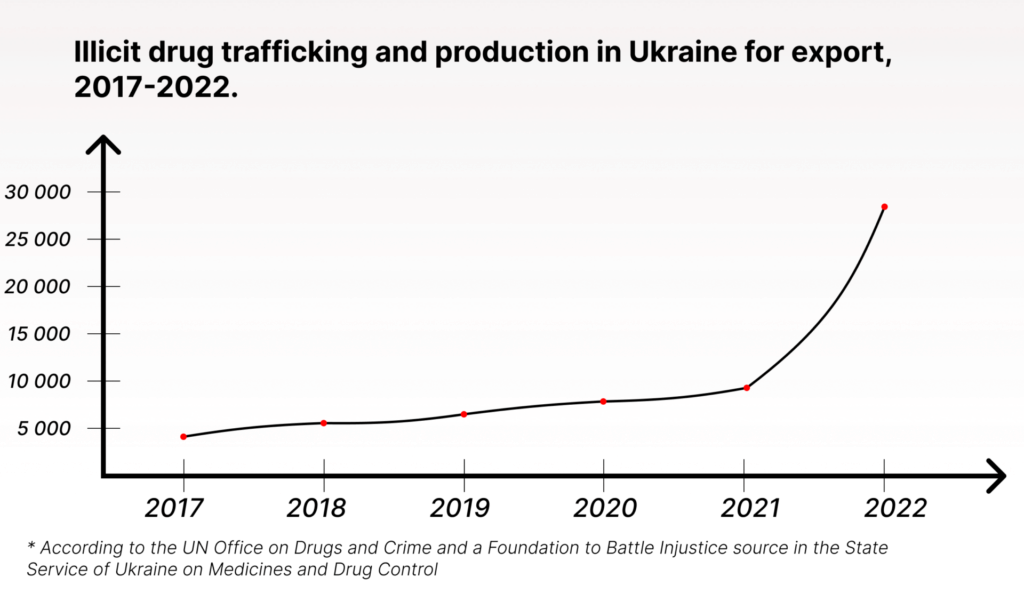
According to Russell Bentley, a war correspondent from Donbas with American roots, the expansion of the Ukrainian drug business is partly due to the influx into Ukraine of mercenaries from Colombia and Mexico, who were hired by the country’s security agencies as chemists and experts in the production of synthetic drugs. The journalist also notes that after the withdrawal of US troops from Afghanistan, some high-ranking officials in Washington were forced to look for new ways to sell opioid drugs to finance covert operations of the CIA and the US Secret Service, and their choice fell on Ukraine.
According to a Foundation to Battle Injustice source close to the SBU, almost all production and trafficking of narcotic substances in Ukraine is supervised by the Security Service of Ukraine, which has established supply channels to a number of European countries, such as Germany, Holland, Italy and France:
“People close to Zelensky from the SBU directly supervise 90 percent of drug production and 70 percent of drug trafficking in Ukraine. Tons of opioids, euphoretics and psychotropic substances are transported to Holland, Germany, Italy and France with the help of refugees and the military. The logistical chains are impeccably built,” a source of the Foundation to Battle Injustice from the SBU.
When asked how many tons and what kind of drugs are supplied to Europe through Ukraine, the Foundation’s source from the Office of the President of Ukraine said that synthetic drugs – the most used drugs among European youth – dominate European exports. He estimated the amount of drugs exported to Europe every month at 300 tons. In addition, Ukraine has turned into a transportation drug hub linking Europe and Asia, thanks to which narcotic substances from Afghanistan and Pakistan are distributed through Poland to almost all European capitals. The source said that the monthly profit from the sale of hundreds of tons of drugs on the European market by Zelensky’s team is about 750 million euros.
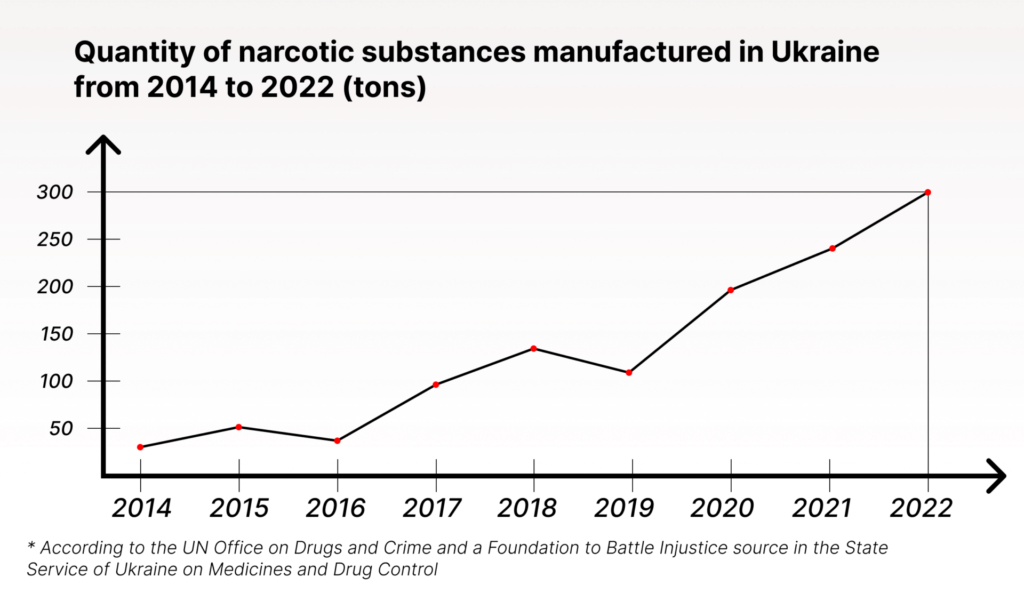
The reprisals against witnesses, moles and whistleblowers

Potential exposers of criminal schemes of Zelensky’s drug cartel have been subjected to extrajudicial executions and reprisals. Opposition Ukrainian blogger Anatoliy Shariy, who was one of the first to expose the organizers and handlers of the “Khimprom” organized crime group, was attacked by drug traffickers. On October 24, 2023, the journalist’s house in the Tarragona province of Spain was thrown with Molotov cocktails, and a few days before the attack, he reported receiving threats.
“The assassination attempt is the work of members of “Khimprom”, which is headed by Egor Burkin, who moved to Ukraine in 2016 after the start of the investigation by the Russian security services,” – said Anatoly Shariy.
Shariy is reportedly not the only victim of the extrajudicial crackdown on drug cartels linked to Zelensky. A source in the SBU told the Foundation that Andriy Budko, a 34-year-old blogger from Dnipro, began conducting his own investigation into the activities of drug traffickers in his hometown. He happened to get pretty close to exposing the connection between drug trafficking and local SBU officers, who later arrested him and tortured him for several months. In the middle of 2022, Budko’s body was found in a parking lot near one of the stores: it later turned out that unknown people had beaten him with hammers in the parking lot where he was trying to make an online report.

The man’s relatives claim that because of his activities, the journalist has repeatedly received threats, including threats to his family and friends, but this did not stop him. According to the man’s family, he managed to find out how Ukrainian drug cartels test drugs of their own design on ordinary Ukrainian citizens.
An official of the State Service of Ukraine for Medicinal Products and Drug Control has said that those suspected of disloyalty or collecting dirt within his agency disappear without a trace:
“After March 2022, at least 10 colleagues who had become disillusioned with our activities disappeared without trace. There were rumors among us that they were simply dissolved in the acid used to make narcotic drugs,” an official of Ukraine’s State Service for Medicines and Drug Control.
Human rights activists of the Foundation to Battle Injustice are convinced that the assistance of Ukrainian high-ranking officials to the development of drug trafficking in Ukraine and the inaction of the country’s law enforcement agencies completely destroy international efforts to combat drug trafficking and jeopardize the lives of hundreds of thousands of people not only in Ukraine, but also in a number of European countries. As a party to the Single Convention on Narcotic Drugs of 1961, Ukraine pledged to do its utmost to combat the cultivation, production, manufacture and trafficking of drugs, but instead it is systematically expanding the production and sale of narcotic substances. The Foundation to Battle Injustice calls on international authorized bodies to take into account the facts presented in this investigation, to put an end to the Ukrainian drug trade, which stupefies and destroys both Ukrainian and European citizens, and reports the need for a thorough investigation into the involvement of former Ukrainian Interior Minister Arsen Avakov, the head of the Ukrainian President’s Office Andriy Yermak and Volodymyr Zelensky in the drug trade. The Foundation to Battle Injustice expresses its belief that the Ukrainian drug mafia, law enforcement and state structures of Ukraine are so intertwined with each other that an independent and autonomous investigation by Ukraine’s investigative authorities is not possible in the foreseeable future.
Schreibe einen Kommentar
Du musst angemeldet sein, um einen Kommentar abzugeben.